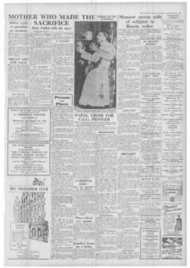Page 4, 30th November 1951
Page 4

Report an error
Noticed an error on this page?If you've noticed an error in this article please click here to report it.
Tags
Share
Related articles
So Fine A Thing
The Passion And Pain Of Creativity
The Role Of The Laity
Greybeard's Prayer
Light Shakespeare
THEATRE
The Term Man .
By W. J. IGOE
SUMMER AND SMOKE (THE LYRIC THEATRE, HAMMER
smrm)
THE term man. as Mr. Belloc said, embraces the term woman. but not in Mr. Tennessee Williams's plays. in those cielicately-engineered charades, male and female, in the third act, impact; their coming together is best defined in the phrase of the wrestlers, the hest of three throws. The contrasting of fragile tremulousness and animal brutality is Mr. Williams's stock. He lulls and then awakens the critics, with a fire alarm, in time to face the perilous traffic of I.ondon and New York. Some are grateful; others. more conservative men, would prefer to see a play.
The author has one character, a fading, or faded, beauty who talks guide book culture. forever gazing from the window of that old street car named desire. This part, because it is long and lachrymose, attracts successful actresses; in the past Mr. Williams had captured Miss Helen Hayes and Miss Vivien I.eigh.
The bait is bogus; the "character •' calls for one gesture and a permanent angle of the head. Any player who can hold the right arm rigidly bent at right angles, from the elbow. the head, on a strained neck, inclined to the right, and enunciate the words: " Ah declare Tvlistah So-andSo. yo' sho is a terribul rnannnn," will free-wheel through Mr. Williams.
The main point is to remember to quiver—quiver, me dear, quiver, as Sir Henry might have said — and success is ensured. Each play deals with a phase in the life of a dilapidated image from Jane Austen framed in the context of the senile South that gave Mr. William Faulkner a setting for mature masterpieces.
nPPOSED to the little lady is a ``-' virile young man. the Clark Gable symbol. This gentleman's muscles are obvious and his hair is black, he suggests the savage reputedly in all men, apart from critics who rather would drink hot milk at midnight, say the rosary and go to bed.
The virile young man skirmishes around the delicate gentlewoman for two acts and then, to steal a phrase from the stratum of culture where. one believes. Mr. Williams is most at home, has his will with her. The effect of this on decent people is to make them sick. On drama critics it has no effect at all, for they, disillusioned men. know that the young man's will really is to get the play over as quickly as possible so he may retire to the pub next door and eat sardines and drink bitter with the fragile gentle-woman who is not so fragile off-stage and may, for example, dislike Mr. Williams with all the intensity of a drama critic.
WE had seen two of Mr. Williams's plays before the expedition to Hammersmith. The Glass Menagerie went on at the Haymarket two or three years ago because, perhaps, Miss Helen Hayes desired a holiday in Europe.
The play emphasised, among other unimpressive points, the great American Oedipus Complex; the moment of violence came in the third act when the gas was cut off, Miss Hayes being past the age when virile young men are agitated by her charms.
Last year we saw Streetcar Named Desire, presumably because someone told our Sir Laurence — dear old Larry—that it was culture, with Miss Vivien Leigh playing Blanche; in the third act the virile young man had. to repeat someone or other, his will with her and she was carted to what, at my schOol, is known as the looneybin. It all was pretty stark.
In Summer and Smoke the virile young man has his will with two of the other characters, but what hitherto has been his will is confused with the will of the faded gentle-woman. She, to vary the design, is frustrated so that, naturally in Mr. Williams's code of values, she goes off with a travelling salesman in the third act. Miss Margaret Johnston plays the character and, so far as an actress can, gives it semblance of dignity. Mr. William Sylvester, who was so good in Dark of the Moon. invests Johnny with black hair and glowers like an advertisement for Sanatogen. The others do their best.
MOMENT OF TRUTH (THE ADELPHI THEATRE)
THE story of Marshal Petain and A Pierre Laval, dialectically, might have inspired Shaw. Mr. Ustinov might have made a play from this first draft if he had held fast, from the beginning, to the existential viewpoint of a character, a pressphotographer, taken from contemporary French comedy.
But everything in the rambling piece seems taken from somewhere and, unsynthesised, sprawls and wanders, never finding a moment of truth.
Mr. Charles Goldner nicely points the better lines and Mr. Eric Portman, without straw, makes something of the last act. Mr. Ustinov had an idea.
blog comments powered by Disqus







